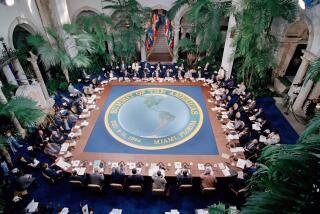Gorbachev Considered Likely to Accept Idea of Annual Summits
- Share via
WASHINGTON — Soviet leader Mikhail S. Gorbachev probably will accept President Reagan’s proposal for annual summit meetings because the attention such meetings command would permit Moscow to dramatize its opposition to U.S. “Star Wars” research, a specialist on Soviet propaganda said Wednesday.
Roy Godson, a Georgetown University professor and the editor of a new journal on Soviet information practices, said that regular high-level meetings would give the Soviets an opportunity to exploit opposition, in both the United States and Europe, to Reagan’s missile defense program, officially known as the Strategic Defense Initiative.
“They are determined to try to stop SDI, and (summit meetings) give them an opportunity to play at the cleavages in the American political system--the differences between elements in State and Defense (departments) and the White House,” Godson said.
‘Split in American Society’
“Moscow is very well aware of the split in American society, and they also know that in Europe we have very few allies on SDI research,” he said.
Godson and Soviet defector Stanislav Levchenko, a former KGB propaganda expert, spoke to a small group of reporters about ways they expect Moscow to try to exploit next week’s Geneva meeting.
Levchenko and Godson predicted a major Soviet information effort in Geneva, much of it revolving around Soviet journalists ostensibly sent to cover the summit. They said the journalists, some of them outright KGB agents and all operating under the discipline of the Communist Party’s international department, can be expected to serve as convenient sources of information for European and other third-country reporters covering the summit.
Levchenko said that Soviet journalists are briefed regularly by the government and that “they know exactly what they are supposed to do.”
Written Off as Failure
Godson said the Soviets have written off as a failure their efforts to generate opposition to deployment of U.S. intermediate-range nuclear forces (INF) in Europe.
He said Communist sloganeers in Europe “have flipped over from anti-INF to anti-SDI. SDI won’t be deployed for years, so the campaign can continue for years.”
The effort will go on regardless of whether there are frequent summit meetings, he said. But summits, by concentrating world attention on arms limitation issues, make it easier for the Soviets to get their point across.
Godson predicted that the Soviets would launch an active “cultural exchange” program after the summit that would send carefully selected academicians and politicians to the United States to encourage opposition to the “Star Wars” program.
At the summit, he said, both sides can be expected to propose people-to-people exchange programs.
“I think the Americans are likely to propose so many exchanges that Moscow will be a little bit on the defensive,” Godson said. “They won’t want to have thousands of American college kids roaming around the Soviet Union, and they certainly don’t want thousands of Soviet kids roaming around the United States. They will try to guide or channel these exchanges.”
More to Read
Sign up for Essential California
The most important California stories and recommendations in your inbox every morning.
You may occasionally receive promotional content from the Los Angeles Times.













